A Unique Experience: the International Canaan Dog Conference, 20-24 March, 2015
© Oleg Boshkov

The Conference is over and all participants have returned to their homes, while here in Israel or in various countries around the world, they have been left with the taste of “more!”. This special event, celebrating 50 years of recognition of the Canaan Dog as the Israel national breed by the Israel Kennel Club and the FCI, provided new understanding of the breed and its country of origin.
Visitors that arrived from abroad were hosted for their first day in Israel by local dog people, so that they could get a feeling of the country and lifestyle. The conference (held 20-24 March) began with a seminar. The three lecturers presented their topics to an enthusiastic audience that filled the lecture room. The first speaker, Prof. Zeev Trainin, President of the FCI Scientific Commission, spoke on the importance of the primitive dogs, and in particular the Canaan Dog, to the cynological world. Dr Monika Baar from the University of Groningen, The Netherlands, spoke on the development of the human-animal bond and, in particular, on the development of service dogs; one of her particular fields of study is Prof. Rudolphina Menzel, the founder of the Canaan Dog breed, who was noted for her work with guide dogs for the blind. The final lecture was presented by Myrna Shiboleth of Shaar Hagai Kennels, one of the conference organizers and long-time breeder and judge, who spoke on “A Biblical Dog in the 21st Century”, and how to live successfully and happily with the Canaan.
The lectures were followed by a panel discussion led by breeders from the US, England, Italy, France and Israel about the future of the breed.
Following the seminar, overseas visitors travelled to the south, to the location selected for the rest of the event, the Field School at Hatzeva, an agricultural settlement in the desert area of Israel. The intention was for the visitors to be able to see and experience the environment in which the Canaans naturally live. The scenery is beautiful and unique and at this time of year, it is green and full of wild flowers from the rains of winter.
On Saturday, in the early morning, the visitors had an opportunity for guided birdwatching, and then in the late morning, the Canaan Dog Specialty Show, awarding the newly created title of Desert Winner, was held. About 20 dogs participated, including three entries from abroad, judged by the very experienced and knowledgeable Dr Agnes Ganami Kertes.
One point of great interest: the Best of Breed winner is a bitch that was free born in the remote desert of the south of Jordan. The cooperation of Israeli and Jordanian dog lovers made it possible to bring her to Israel and to register her. Bat Yarden me Dibaan Jeyni is the first free born dog to become an Israel champion. At this show, Jeyni received the honour of becoming the first Desert Winner and BOB.
Jeyni was born in the southern desert of Jordan, in an area where there is little population and the conditions are very harsh. She and her brother Jimmy were caught by a villager from the tiny village Dibaan, his intention was to raise them as guard dogs. When the villager decided, after a few months, that he no longer wanted the dogs, he brought the two pups, about seven months old, to the veterinarian in Amman to be put to sleep.
The vet could not agree. These were healthy and strong youngsters and he saw no reason to put them down. He refused and offered to take them and find them a new home.
An American Peace Corps worker living in Amman offered them a foster home until they could be adopted. He asked the vet what kind of dogs they are – “Canaan Dogs”, was the answer.
When his wife in the US heard about the pups, she searched the internet and found the American breed club, and notified them that there were two young Canaans in Jordan looking for a home. The breed club immediately got in touch with Myrna Shiboleth of Shaar Hagai Kennels in Israel.
Always interested in the possibility of finding dogs from new bloodlines to introduce into the gene pool, Myrna immediately got in touch by email and Skype. The dogs were of great interest if there was a way to get them to Israel. “No problem”, was the American’s response. He would be happy to keep them, vaccinate them, take care of the necessary documents and then drive them to Israel.
About two months later, after the long drive from Amman to near Jerusalem, Janey and Jimmy arrived at Shaar Hagai Kennels. They were happy, outgoing, curious, and had no problems adjusting to a new home. From their behaviour, one would never imagine that these were puppies that had been born in the desert, and gone through such changes in their short lifetime.
Janey stayed at Shaar Hagai. She impressed everyone she met with her stable and sweet temperament. She was registered in the Stud Book Annex as new foundation stock. She loved going to shows and she became the first free-born desert dog to become an Israel Champion.
Janey has been the mother of two litters. Several of her pups have travelled abroad to add new bloodlines to the Canaan breeding there.
Since her last litter, Janey has started a new career. She is working as a guard dog for a small herd of sheep on a kibbutz. She fulfills the purpose of a dog that is a keen guard, preventing predation and theft, but that is friendly to kibbutz residents and their children. Janey is ideal for the job. She loves the sheep and treats the lambs with the care she took with her own puppies, is friendly and outgoing to visitors during normal hours, and is a serious guard dog at other times, protecting her flock from all dangers.
Since Janey does love dog shows, it was decided to bring her to the Specialty Show of the International Canaan Dog Conference, 20-24 March, 2015. Janey showed with her usual bounce and enthusiasm, and gained the title of Best of Breed and the new special title “Desert Winner.”
© Oleg Boshkov
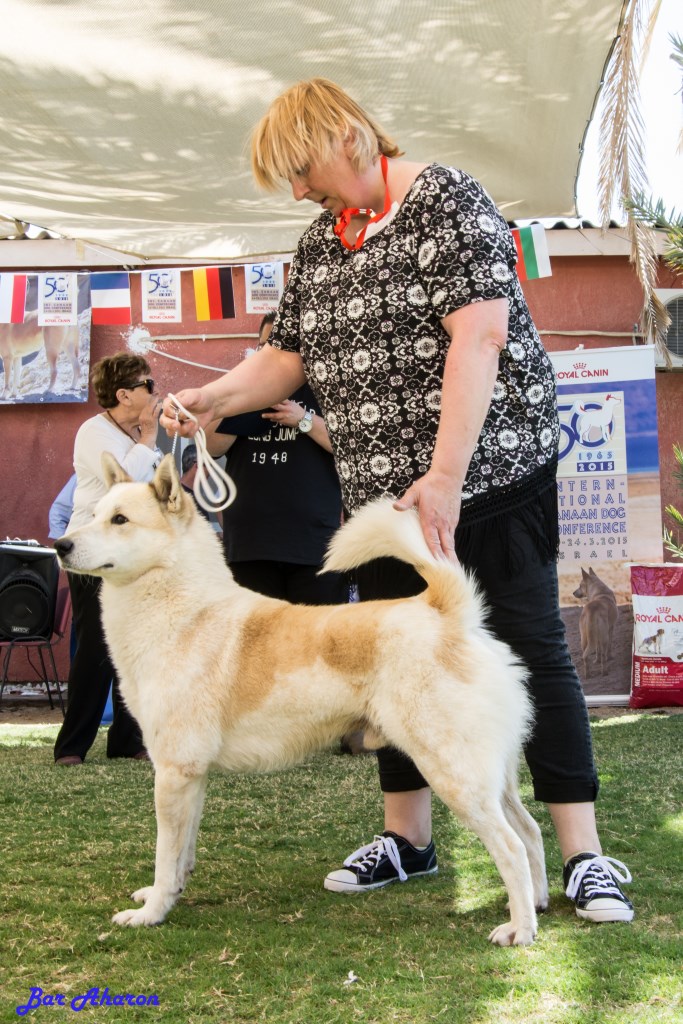

BOB, BIS Bat Yarden me Dibaan Jeyni
Owner: Myrna Shiboleth and Ofir Paz Mishmar HaEmek
BOS Chanco’s Kavah
Breeder: Maria Selin
Owner: Laurence Aries
The Best Male and BOS was a Canaan dog born in Sweden and living in France, Ch. Chanco’s Kavah. A great example of the international flavour of the event!
Best Junior in show was a son of Janey, Dixon me Shaar Hagai.
Best Puppy was Ben Negev me Canaan Oasis, bred in Germany and with Bulgarian owner.
The following day was the highlight of the event. A tour was planned through the southern desert areas where many of the breed founder stock originated, and where it is still possible to find free living dogs and dogs that are working with Bedouin herds. Because of the modernisation of the Bedouin life style, many Bedouin do not live in the traditional manner, and do not have dogs now. There is also a great expansion of settlements in these areas, which has destroyed the niche in which the dogs lived in the past. So although it is still possible to find pure free living and Bedouin Canaans, it is becoming very difficult. When planning this tour, there was no way to know if we would be lucky enough to see any dogs at all.
But luck was definitely with us! We were able to see a number of different Bedouin herds accompanied by their dogs, some of which were lovely examples of the breed. Visitors were able to see the conditions in which they live, beautiful and very harsh, and their value as working dogs to the herders, as guardians of the flocks. It is important to note that these dogs have the job of giving warning and keeping predators away, but not of being attack dogs.
The high point of the day was when we were driving past a dump near a Bedouin village, Hura. This was a place where the carcasses of dead sheep were thrown, and there were vultures circling overhead. A male Canaan was spotted and we stopped to try and get closer. The dog tried to lead our group leader away, and when we approached closer, a bitch came out of a thick stand of thistle bushes and began to bark at us. We could immediately see that she was nursing. She also tried to distract us, but we were able to find her puppies, 4 females of about six weeks of age, hidden under a thistle bush on a thick layer of old sheep skins. The puppies were self confident and unafraid, had obviously never had contact with people before, and were fat and completely clean of parasites. Both parents, who stood at a watchful distance, but were unable to cope with this group of more than 20 people, were also in excellent physical condition.
Finding free-born puppies, and at an age when they can still be approached, is a very rare occurrence. This was a thrilling experience, and one of the puppies has come home with us to bring in a new bloodline in the future.
The day ended with a visit to one of the most scenic desert areas, the Great Crater, and a chance to watch the sunset over the rocky colourful hills.
The last day of the conference ended with a drive along the Dead Sea and a visit to Jerusalem. No trip to Israel is complete without seeing the sights of the holy city.
Although few of the participants, from abroad and from Israel, had ever met personally before, a wonderful spirit was felt throughout all the formal activities and the mutual meals, and evening discussions. Many new friendships have been forged, and our hope is that this will be a positive push for the continuation of the Canaan breed, for understanding a biblical dog living in the modern world, and for international cooperation for the good of the breed. Visitors who have become friends have also promised to visit again soon.
© Bar Aharon
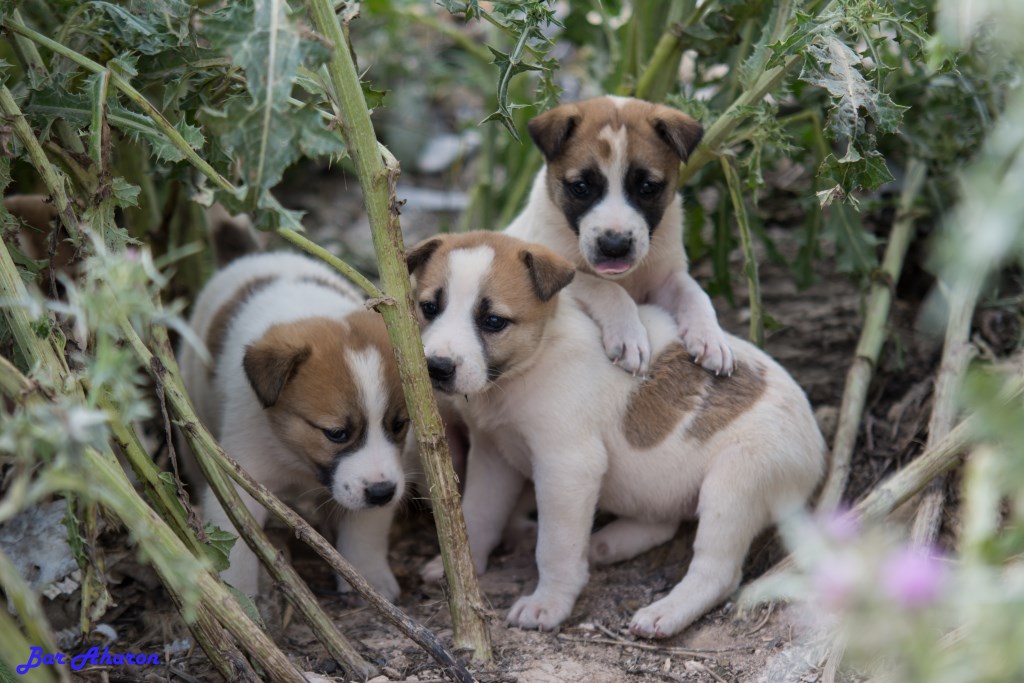

Wild litter
© Bar Aharon
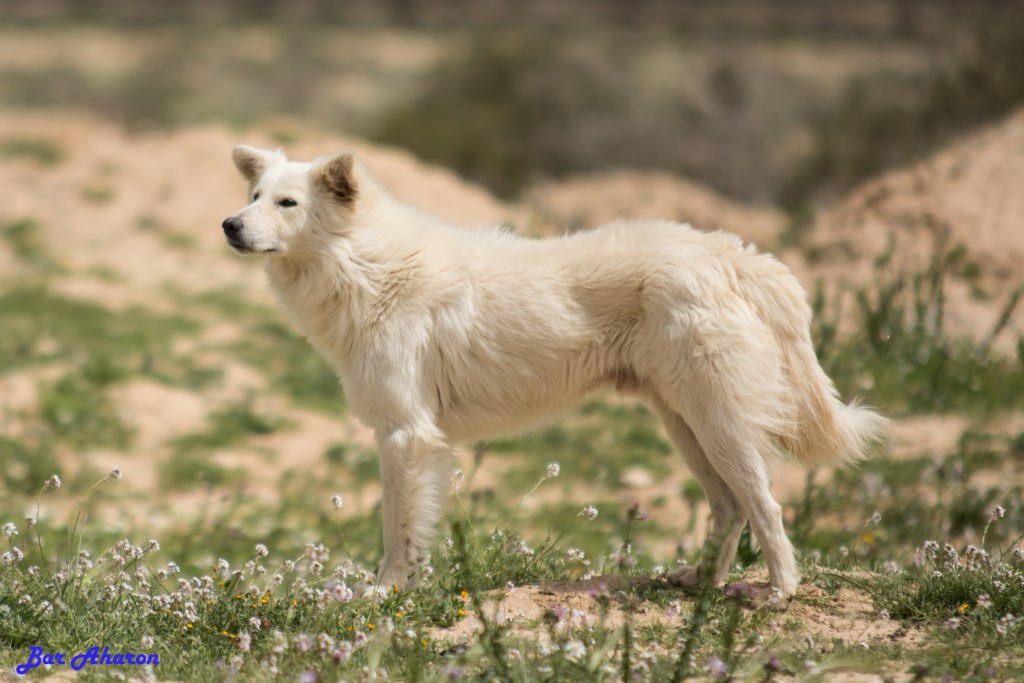

Wild canaan
© Bar Aharon
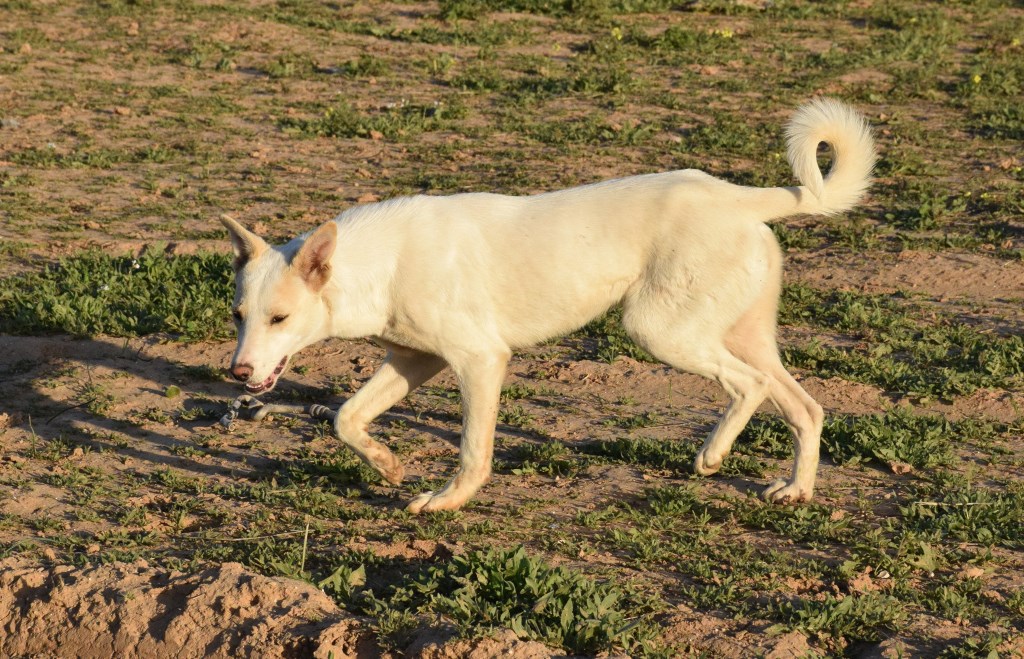

Wild canaan
© Bar Aharon
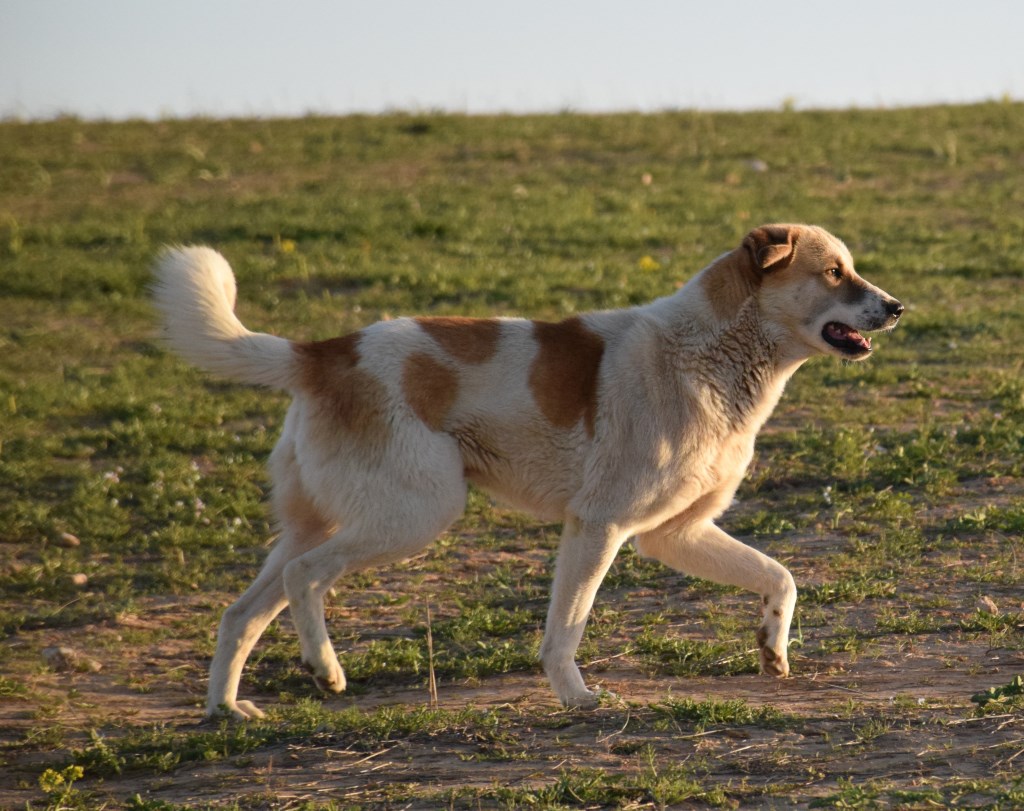

Wild canaan
© Bar Aharon
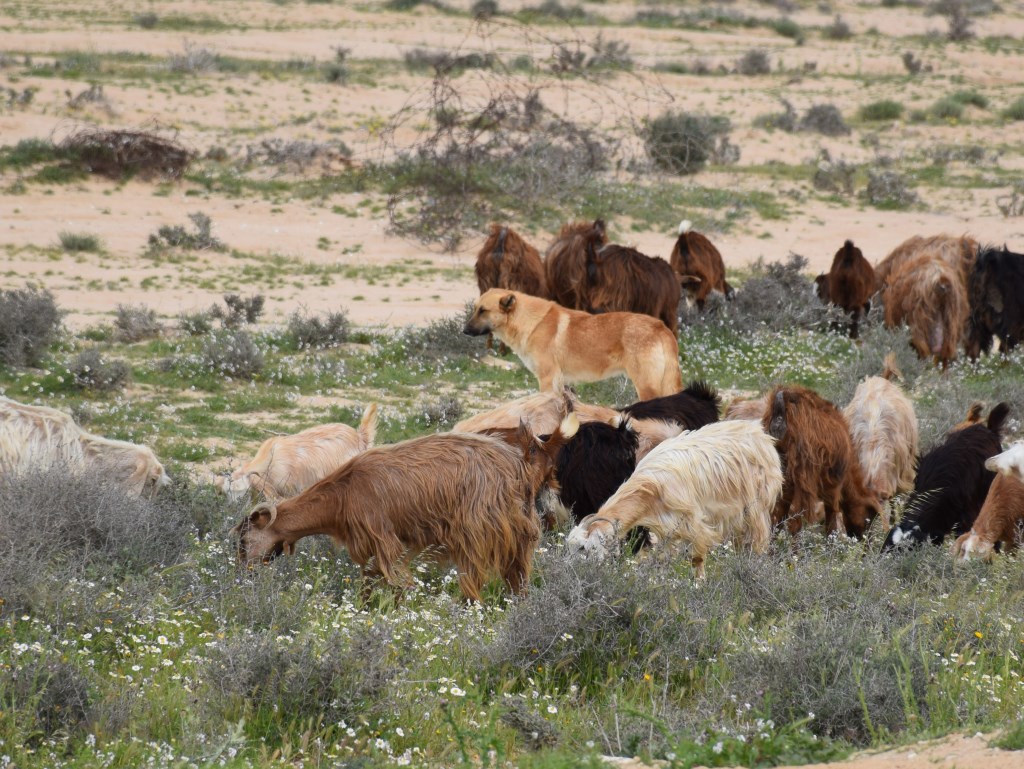

Wild canaan
© Bar Aharon


Wild canaan